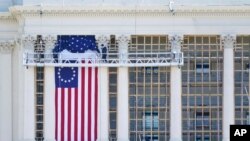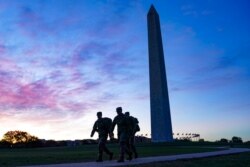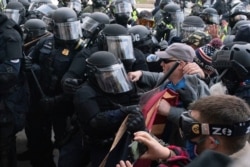Concerns are growing that the storming of the U.S. Capitol last week by extremists supporting U.S. President Donald Trump may be the start of what could be a series of potentially armed and violent protests across the country leading up to the inauguration of President-elect Joe Biden.
The Federal Bureau of Investigation on Monday told VOA it is examining evidence suggesting groups or individuals may be looking to incite violence or engage in criminal activity in connection with the planned transfer of power.
"While our standard practice is to not comment on specific intelligence products, the FBI is supporting our state, local and federal law enforcement partners," the bureau said in a statement.
"Our focus is not on peaceful protesters, but on those threatening their safety and the safety of other citizens with violence and destruction of property," the statement added.
An FBI bulletin, first obtained by ABC News and Yahoo News, likewise cautions about the potential for violence, in Washington as well as in all 50 states.
The FBI has "received information about an identified armed group intending to travel to Washington, D.C., on 16 January," the bulletin said. "They have warned that if Congress attempts to remove POTUS via the 25th Amendment a huge uprising will occur."
The bulletin further warned that a group is calling for the storming of state, local and federal buildings should efforts to remove Trump from office before the January 20 inauguration succeed.
While not commenting on the specific threats, other government agencies are taking steps to bolster security.
The Department of Homeland Security (DHS) announced Monday it is directing the U.S. Secret Service, normally tasked with presidential security, to start its inauguration security operation this Wednesday, six days earlier than planned.
DHS cited "events of the past week and the evolving security landscape," as the reason for the change.
National Guard
Earlier Monday, the U.S. National Guard said it had authorized up to 15,000 members to assist with security efforts for the January 20 inauguration.
"To date, our troops have been requested to support security, logistics, liaison, and communication missions," Gen. Daniel Hokanson, chief of the National Guard Bureau, said in a statement.
Guard officials said 6,200 troops from six states are in Washington supporting civilian authorities in the aftermath of last Wednesday's riot, during which the U.S. Capitol was briefly overrun by thousands of pro-Trump extremists, leaving five people dead.
The National Guard has a long history of helping to secure U.S. presidential inaugurations; about 8,000 National Guard members were present during Trump's inauguration in 2016.
The U.S. National Park Service also announced Monday it will close the Washington Monument from January 11 until after the inauguration, citing threats of violence.
"Groups involved in the January 6, 2021, riots at the U.S. Capitol continue to threaten to disrupt the 59th presidential inauguration on January 20, 2021," NPS wrote in a statement on its website.
The NPS said other parts of the National Mall and roadways could be blocked in the coming weeks, as well.
Emergency declaration
In addition, the White House late Monday announced Trump approved an emergency declaration for Washington, lasting until January 24, four days after the inauguration.
The move clears the way for key federal agencies, including DHS and the Federal Emergency Management Agency (FEMA) to coordinate and mobilize emergency assistance should it be needed.
But there is also some concern the heightened security may be needed beyond the inauguration.
"The State of the Union [presidential address to Congress] is just around the corner," Terry Gainer, a former chief for the Capitol Police who also served as the Senate Sergeant-at-arms, told a webinar Monday.
"The Right to Life March will happen [January 29]," Gainer added. "The ongoing discussions with the impeachment – all sorts of things that would attract wrongdoers to come there, as well as protesters who should legitimately protest and have a right to do it."
In contrast to the latest warnings and increased precautions, both the FBI and the Washington Metropolitan Police have said there was no intelligence before last Wednesday's planned protests to suggest portions of the crowd could become violent.
Allegations of pushback
Outgoing U.S. Capitol Police Chief Steven Sund has told The Washington Post that he met with pushback from military officials, and that security officials in the House of Representatives and the Senate denied his request to ask the National Guard to be ready to help ahead of last week's attack on the U.S. Capitol.
"If we would have had the National Guard, we could have held them at bay longer until more officers from our partner agencies could arrive," Sund told the Post.
But the U.S. Army late Monday refuted Sund's suggestions that military officials sought to deny any requests for help.
"I did not make the statement or any comments similar to what was attributed to me by Chief Sund in the Washington Post article," Lt. Gen. Walter Piatt, the Director of the Army Staff, countered in a statement.
"But [I] would note that even in his telling he makes it clear that neither I, nor anyone else from DoD, denied the deployment of requested personnel," Piatt added.
A Pentagon spokesman said last week that U.S. Capitol Police did not make a request for National Guard backup before the riot that left five people dead, including a Capitol police officer. A second officer who responded to the assault on the Capitol died off duty.
Pro-Trump rioters overwhelmed the outnumbered Capitol Police and spent several hours inside the building Wednesday as security rushed lawmakers to safety. Authorities took hours reasserting control of the building, with Capitol Police eventually getting help from the National Guard, local police and federal law enforcement agencies.
In the wake of the attack, several lawmakers have questioned Capitol Police preparation. Sund, Senate Sergeant-at-Arms Michael Stenger and House Sergeant-at-Arms Paul Irving have all resigned.
VOA's Esha Sarai contributed to this report.







